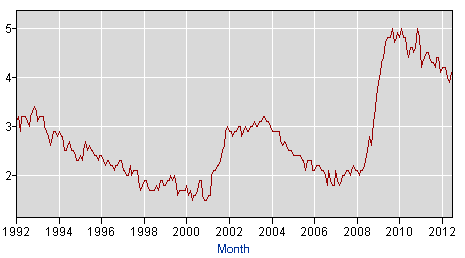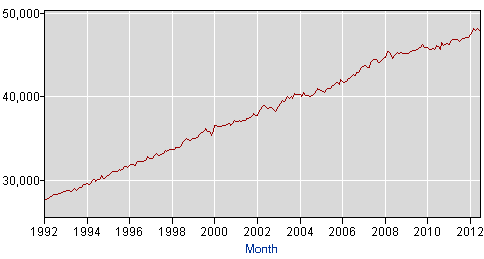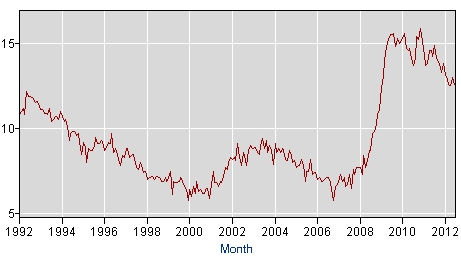August 17, 2012
The WAPO has a nicely graphed blog post telling us that there was no recession for college grads. It shows that employment for college grads has risen at a strong pace since the start of the recovery and is well above its pre- recession level. The problem is that we need a denominator in this story. (This seems to be a recurring problem at the WAPO, like when they tell us about the multi-trillion dollar shortfall projected for Social Security without pointing out that it is equal to around 0.6 percent of future GDP.) Anyhow fans of fractions can see that there was in fact a serious recession for college grads which still lingers today. As the graph shows, the unemployment rate for college grads rose from less than 2.0 percent before the downturn to a peak of more than 5.0 percent in 2009. Currently it is hovering near 4.0 percent, more than twice its pre-recession level.
Unemployment Rate for People With at Least a College Degree
 Source: Bureau of Labor Statistics.
Source: Bureau of Labor Statistics.
So how do we get a doubling of unemployment at a time when college grads are scooping up millions of new jobs? Yes folks, this is where our old friend the denominator comes in. It seems that there has been an even more rapid rise in the number of college grads in the labor force over the last five years as shown below.
People with a College Degree or Higher in the Labor Force
 Source: Bureau of Labor Statistics.
Source: Bureau of Labor Statistics.
So even though college grads were getting more jobs, they were not getting them at a fast enough pace to keep up with the growth in the number of college grads in the labor force. Just to be clear, college grads were still doing well in the scheme of things. Here’s the picture for those at the other end of the educational spectrum, people without high school degrees.
Unemployment Rate for People with Less than a High School Degree

Source: Bureau of Labor Statistics.
As can be seen unemployment also doubled for people with less than a high school degree, but the starting point was much higher at close to 7.0 percent. In fact, this rise in unemployment understates the true impact of the downturn, since many people without high school degrees simply left the labor force as a result of their bleak job prospects. (This undoubtedly happened with some college grads too, but the effect was likely much smaller.)
The moral of this story is that the recession has hit everyone. This is important because some folks could be led to believe from this employment story that the problem is that we just need more people to get college degrees and then they will be able to find good paying jobs. However, when we bring in our old friend the denominator we can see that this is not true. The problem is simply a lack of demand in the economy. Education helps in a downturn as it does during normal times, but even the most highly educated workers are getting whacked by this recession.







Comments